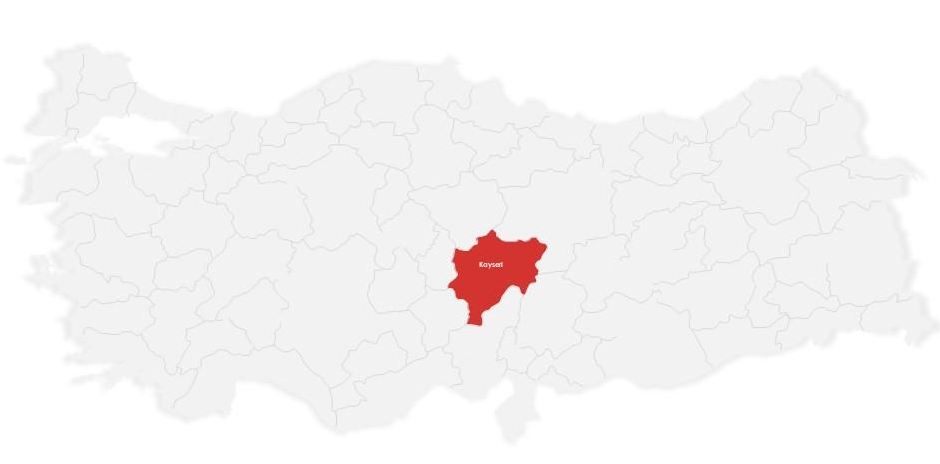Kayseri Caucasian Association Begins Exiting KAFFED Over Concerns

The Kayseri Caucasian Association is recognised as a leading and established civil society organisation in the Circassian diaspora.
KAYSERİ ― In a significant development within Türkiye's North Caucasian community, the Kayseri Caucasian Association has officially started the process to terminate its membership in the Federation of the Caucasian Associations (KAFFED). This pivotal move, stemming from a membership dating back to KAFFED's inception in 2003, underscores deep-rooted issues and disagreements within the organisation, reflecting broader challenges faced by the Circassian diaspora in Türkiye.
Founded on July 3, 2003, KAFFED stands as the largest and most influential North Caucasian umbrella organisation in Türkiye, embracing 56 active associations, including the Kayseri Caucasian Association since its establishment.
Tracing its history back to 1968, the Kayseri Caucasian Association is recognised as one of the largest and most established civil society organisations in the Circassian diaspora. Renowned for its significant contributions in identity, culture, and language, the association has played a crucial role in advocating for rights both in the homeland and the diaspora.
Kayseri is a central Anatolian city with a significant Circassian and Abaza population. Although some Circassian associations and prominent figures of the Circassian community in Kayseri claim that the Circassian population in Kayseri is between 80,000 and 100,000, it is believed that the real number is below these numbers. The city is known for its strong preservation of Circassian language and culture, making the Kayseri Caucasian Association a crucial stakeholder in the community's affairs.
The association's statement on its website, particularly addressing its relationship with the International Circassian Association (ICA) based in Nalchik, Kabardino-Balkaria, highlights critical concerns: "A group serving Russia's interests is acting against the fundamental rights related to the cultures and identities of Circassians living in Türkiye diaspora." (The previous KAFFED administration, led by Prof. Dr. Ümit Dinçer and supported by the Kayseri Circassian Association, had questioned their relations with the ICA, clarifying that KAFFED was not legally a member of this international body, formed in Nalchik, Kabardino-Balkaria, Russia, in May 1991. The KAFFED Board of Directors also published the KAFFED-ICA correspondence in adherence to the principle of transparency to support their claims.)
Furthermore, the statement criticises KAFFED's charter and its focus on maintaining the status quo, leading to obstacles that have prompted the association to consider withdrawing from KAFFED.
Some of the key issues raised by the Kayseri Caucasian Association include:
Inadequate Response to Educational Changes in Russia: The association has criticised KAFFED for not responding effectively to the Russian Federation's education system changes, which relegated national languages in Federated Republics, including Circassian, to elective courses.
Labelling Dissent as Hostility: The environment within KAFFED has been described as intolerant, with those expressing differing opinions often labeled as enemies of the Homeland and Russia.
Representation and Participation Concerns: The association has raised issues about the delegate system in KAFFED, suggesting it allows inactive members to disproportionately influence major decisions.
Lack of Effective Advocacy: KAFFED has been accused of failing to adequately address and advocate for critical issues impacting the Circassian community, particularly in maintaining and fostering relations with the Circassian homeland.
Stance During Russian-Ukrainian War: [During the previous administration] KAFFED's neutral stance during the conflict, beginning on February 24, 2022, was controversially seen as hostile towards Russia. Criticism was also directed at the previous KAFFED administration's call for aid to the North Caucasus Humanitarian Crisis Committee, perceived as pro-American and supportive of Ukraine.
Cancellation of Invitation for the 100th Anniversary of the Republic of Adygeya: This incident, where an invitation to KAFFED was withdrawn without explanation, has strained relations with the ICA.
Internal Governance and Democratic Deficiencies: The association has voiced concerns over internal governance practices within KAFFED, particularly the domination of decision-making by specific groups and the lack of effective democratic processes.
The Kayseri Caucasian Association's statement concludes by emphasising the importance of civil and democratic values in organisational governance. It argues that for NGOs to thrive, they must be pluralistic, value collective wisdom, and be open to change and transformation. The statement also addresses the necessity to end the association's KAFFED membership, citing entrenched majoritarian approaches, marginalised demands for change, and various slanders as detrimental to the association and community.
This decision, still in the finalisation stages, has sparked significant discussions within the Turkish Circassian community. The Kayseri Caucasian Association seeks support from its members and the broader community during this crucial transition, with potential implications for the structure and dynamics of Circassian diaspora organisations in Türkiye.
